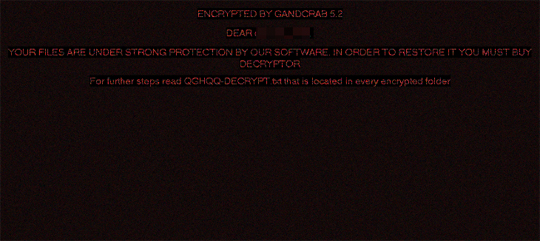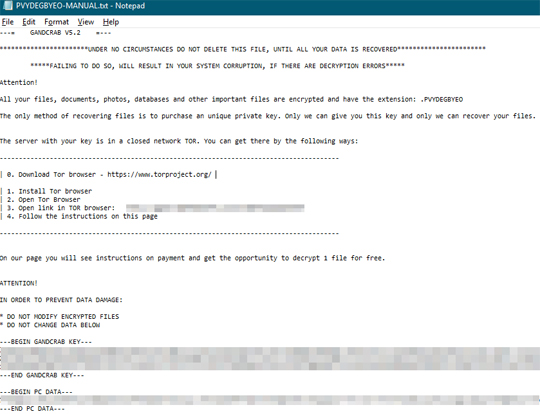Ransom.Win32.GANDCRAB.THBBGAI
Windows


Threat Type: Ransomware
Destructiveness: No
Encrypted: Yes
In the wild: Yes
OVERVIEW
This Ransomware arrives on a system as a file dropped by other malware or as a file downloaded unknowingly by users when visiting malicious sites. It may be downloaded by other malware/grayware from remote sites.
It connects to certain websites to send and receive information. It takes advantage of certain vulnerabilities. It deletes itself after execution.
It drops files as ransom note.
TECHNICAL DETAILS
Arrival Details
This Ransomware arrives on a system as a file dropped by other malware or as a file downloaded unknowingly by users when visiting malicious sites.
It may be downloaded by the following malware/grayware from remote sites:
Installation
This Ransomware drops the following files:
- %User Temp%\bxmeoengtf.bmp
- {Encrypted Folder}\{Random}-MANUAL.txt
(Note: %User Temp% is the current user's Temp folder, which is usually C:\Documents and Settings\{user name}\Local Settings\Temp on Windows 2000, XP, and Server 2003, or C:\Users\{user name}\AppData\Local\Temp on Windows Vista, 7, and 8.)
It adds the following mutexes to ensure that only one of its copies runs at any one time:
- BitHuender
Other System Modifications
This Ransomware changes the desktop wallpaper by modifying the following registry entries:
HKEY_CURRENT_USER\Control Panel\Desktop
Wallpaper = "%User Temp%\bxmeoengtf.bmp"
It sets the system's desktop wallpaper to the following image:
Process Termination
This Ransomware terminates the following processes if found running in the affected system's memory:
- agntsvc.exe
- dbeng50.exe
- dbsnmp.exe
- encsvc.exe
- excel.exe
- firefoxconfig.exe
- infopath.exe
- isqlplussvc.exe
- msaccess.exe
- msftesql.exe
- mspub.exe
- mydesktopqos.exe
- mydesktopservice.exe
- mysqld.exe
- mysqld-nt.exe
- mysqld-opt.exe
- ocautoupds.exe
- ocomm.exe
- ocssd.exe
- onenote.exe
- oracle.exe
- outlook.exe
- powerpnt.exe
- sqbcoreservice.exe
- sqlagent.exe
- sqlbrowser.exe
- sqlservr.exe
- sqlwriter.exe
- steam.exe
- synctime.exe
- tbirdconfig.exe
- thebat.exe
- thebat64.exe
- thunderbird.exe
- visio.exe
- winword.exe
- wordpad.exe
- xfssvccon.exe
Information Theft
This Ransomware gathers the following data:
- Username
- Computer Name
- Network Information
- System Language
- Machine Keyboard Layout
- OS Version and Platform
- AV Products Installed
- Processor Information
- IP Address
- Drives Information (Nerwork or Local)
- Ransom ID
- GandCrab Internal Info:
- id
- sub_id
- version
- action
Other Details
This Ransomware connects to the following website to send and receive information:
- http://{URL}/{string1}/{string2}/{string3}.{string4}
- Where URL is equal to the following:
- www.{BLOCKED}orp.link
- www.{BLOCKED}rsport.biz
- www.{BLOCKED}nau.biz
- www.{BLOCKED}iinfissi.com
- www.{BLOCKED}ck.biz
- www.{BLOCKED}ay.biz
- www.{BLOCKED}m.com
- www.{BLOCKED}ellness.com
- www.{BLOCKED}eisshorn.com
- www.{BLOCKED}od.com
- www.{BLOCKED}ckhoteldavos.com
- www.{BLOCKED}ere-locarno.com
- www.{BLOCKED}t
- Where string1 is equal to the following:
- wp-content
- statis
- content
- includes
- data
- uploads
- news
- Where string2 is equal to the following:
- images
- pictures
- image
- graphic
- assets
- pics
- imgs
- tmp
- Where string3 is equal to the combination of the following:
- im
- de
- ka
- ke
- am
- es
- so
- fu
- se
- da
- he
- ru
- me
- mo
- th
- zu
- Where string4 is equal to the following:
- jpg
- png
- gif
- bmp
It does the following:
- Avoids encrypting files with the following extensions:
- ani
- cab
- cpl
- cur
- diagcab
- diagpkg
- dll
- drv
- lock
- hlp
- ldf
- icl
- icns
- ico
- ics
- lnk
- key
- idx
- mod
- mpa
- msc
- msp
- msstyles
- msu
- nomedia
- ocx
- prf
- rom
- rtp
- scr
- shs
- spl
- sys
- theme
- themepack
- exe
- bat
- cmd
- gandcrab
- KRAB
- CRAB
- zerophage_i_like_your_pictures
- {Generated random characters appended on encrypted file names}
- delete shadow copies
- It checks for the presence of the following antivirus and security applications:
- AVP.EXE
- ekrn.exe
- avgnt.exe
- ashDisp.exe
- NortonAntiBot.exe
- Mcshield.exe
- avengine.exe
- cmdagent.exe
- smc.exe
- persfw.exe
- pccpfw.exe
- fsguiexe.exe
- cfp.exe
- msmpeng.exe
- It encrypts files in all available drives and shared folders
It takes advantage of the following vulnerabilities:
It deletes itself after execution.
Ransomware Routine
This Ransomware avoids encrypting files with the following strings in their file name:
- desktop.ini
- autorun.inf
- ntuser.dat
- iconcache.db
- bootsect.bak
- boot.ini
- ntuser.dat.log
- thumbs.db
- ntldr
- NTDETECT.COM
- Bootfont.bin
- -MANUAL.txt
It avoids encrypting files found in the following folders:
- ProgramData
- IETldCache
- Boot
- Program Files
- Tor Browser
- All Users
- Local Settings
- Windows
- %Windows%
- %AppDataLocal%
- %Program Files%\Common Files
- %Program Files%
(Note: %Windows% is the Windows folder, where it usually is C:\Windows on all Windows operating system versions.. %AppDataLocal% is the Local Application Data folder, which is usually C:\Documents and Settings\{user name}\Local Settings\Application Data on Windows 2000, XP, and Server 2003, or C:\Users\{user name}\AppData\Local on Windows Vista, 7, and 8.. %Program Files% is the default Program Files folder, usually C:\Program Files in Windows 2000, Server 2003, and XP (32-bit), Vista (32-bit), 7 (32-bit), and 8 (32-bit), or C:\Program Files (x86) in Windows XP (64-bit), Vista (64-bit), 7 (64-bit), and 8 (64-bit).)
It appends the following extension to the file name of the encrypted files:
- .{Random}
It drops the following file(s) as ransom note:
SOLUTION
Step 1
Before doing any scans, Windows XP, Windows Vista, and Windows 7 users must disable System Restore to allow full scanning of their computers.
Step 2
Note that not all files, folders, and registry keys and entries are installed on your computer during this malware's/spyware's/grayware's execution. This may be due to incomplete installation or other operating system conditions. If you do not find the same files/folders/registry information, please proceed to the next step.
Step 3
Restart in Safe Mode
Step 4
Search and delete these files
- %User Temp%\bxmeoengtf.bmp
- {Encrypted Folder}\{Random}-MANUAL.txt
Step 5
Restart in normal mode and scan your computer with your Trend Micro product for files detected as Ransom.Win32.GANDCRAB.THBBGAI. If the detected files have already been cleaned, deleted, or quarantined by your Trend Micro product, no further step is required. You may opt to simply delete the quarantined files. Please check this Knowledge Base page for more information.
Step 6
Restore encrypted files from backup.
Step 7
Reset your Desktop properties
Did this description help? Tell us how we did.





